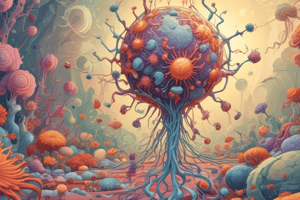Podcast
Questions and Answers
What is the primary function of the immune system?
What is the primary function of the immune system?
- To distinguish between self and non-self
- To defend the body against infection and disease (correct)
- To eliminate healthy cells
- To produce antibodies
Which branch of the immune system provides immediate, non-specific defense against infection?
Which branch of the immune system provides immediate, non-specific defense against infection?
- Humoral immunity
- Adaptive immune system
- Innate immune system (correct)
- Cell-mediated immunity
What is the function of T cells in the immune system?
What is the function of T cells in the immune system?
- To activate dendritic cells
- To produce antibodies
- To engulf and digest foreign particles and microorganisms
- To recognize and eliminate infected cells or produce chemical signals (correct)
What is the role of B cells in the immune system?
What is the role of B cells in the immune system?
What is the function of dendritic cells in the immune system?
What is the function of dendritic cells in the immune system?
What is the result of immunological tolerance?
What is the result of immunological tolerance?
What is an example of an immunological disorder?
What is an example of an immunological disorder?
What is the function of macrophages in the immune system?
What is the function of macrophages in the immune system?
Flashcards are hidden until you start studying
Study Notes
Immune System Overview
- The immune system is a complex network of cells, tissues, and organs that work together to defend the body against infection and disease.
- It is composed of two main branches: the innate immune system and the adaptive immune system.
Innate Immune System
- Provides immediate, non-specific defense against infection.
- Includes physical barriers (skin, mucous membranes), cellular components (neutrophils, macrophages), and chemical factors (complement system).
Adaptive Immune System
- Provides specific, long-term immunity against specific pathogens.
- Involves the activation of T cells and B cells.
- Involves antigen processing and presentation, and the production of antibodies.
Cells of the Immune System
- T cells (T lymphocytes):
- Recognize and eliminate infected cells or produce chemical signals to activate other immune responses.
- Divided into two subtypes: CD4+ (T helper cells) and CD8+ (cytotoxic T cells).
- B cells (B lymphocytes):
- Produce antibodies (immunoglobulins) to neutralize or remove pathogens.
- Can also activate other immune responses.
- Dendritic cells: Antigen-presenting cells that activate T cells and B cells.
- Macrophages: Engulf and digest foreign particles and microorganisms.
- Neutrophils: Phagocytic cells that engulf and digest foreign particles and microorganisms.
Immune Responses
- Humoral immunity: Involves the production of antibodies by B cells to neutralize or remove pathogens.
- Cell-mediated immunity: Involves the activation of T cells to eliminate infected cells or produce chemical signals.
Immunological Tolerance
- The ability of the immune system to distinguish between self and non-self.
- Involves the regulation of immune responses to prevent autoimmune diseases.
Immunological Disorders
- Autoimmune diseases: The immune system attacks self-antigens, leading to diseases such as rheumatoid arthritis and lupus.
- Immunodeficiency diseases: The immune system is weakened, making the body more susceptible to infections, such as HIV/AIDS.
- Hypersensitivity reactions: Overactive immune responses, such as allergies and anaphylaxis.
Immune System Overview
- The immune system is a complex network that defends the body against infection and disease, comprising two main branches: innate and adaptive.
Innate Immune System
- Provides immediate, non-specific defense against infection, including:
- Physical barriers (skin, mucous membranes)
- Cellular components (neutrophils, macrophages)
- Chemical factors (complement system)
Adaptive Immune System
- Provides specific, long-term immunity against specific pathogens, involving:
- Activation of T cells and B cells
- Antigen processing and presentation
- Production of antibodies
Cells of the Immune System
- T cells (T lymphocytes):
- Recognize and eliminate infected cells or produce chemical signals
- Divided into two subtypes: CD4+ (T helper cells) and CD8+ (cytotoxic T cells)
- B cells (B lymphocytes):
- Produce antibodies (immunoglobulins) to neutralize or remove pathogens
- Can also activate other immune responses
- Dendritic cells:
- Antigen-presenting cells that activate T cells and B cells
- Macrophages:
- Engulf and digest foreign particles and microorganisms
- Neutrophils:
- Phagocytic cells that engulf and digest foreign particles and microorganisms
Immune Responses
- Humoral immunity:
- Involves production of antibodies by B cells to neutralize or remove pathogens
- Cell-mediated immunity:
- Involves activation of T cells to eliminate infected cells or produce chemical signals
Immunological Tolerance
- The immune system's ability to distinguish between self and non-self, involving regulation of immune responses to prevent autoimmune diseases.
Immunological Disorders
- Autoimmune diseases:
- The immune system attacks self-antigens, leading to diseases such as rheumatoid arthritis and lupus
- Immunodeficiency diseases:
- The immune system is weakened, making the body more susceptible to infections, such as HIV/AIDS
- Hypersensitivity reactions:
- Overactive immune responses, such as allergies and anaphylaxis
Studying That Suits You
Use AI to generate personalized quizzes and flashcards to suit your learning preferences.




